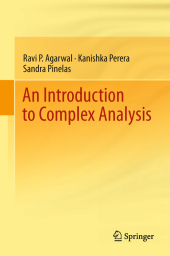 Neuerscheinungen 2014Stand: 2020-02-01 |
Schnellsuche
ISBN/Stichwort/Autor
|
Herderstraße 10
10625 Berlin
Tel.: 030 315 714 16
Fax 030 315 714 14
info@buchspektrum.de |

Ravi P. Agarwal, Kanishka Perera, Sandra Pinelas
(Beteiligte)
An Introduction to Complex Analysis
2011. 2014. xiv, 331 S. 235 mm
Verlag/Jahr: SPRINGER, BERLIN; SPRINGER US; SPRINGER 2014
ISBN: 1-489-99716-4 (1489997164)
Neue ISBN: 978-1-489-99716-6 (9781489997166)
Preis und Lieferzeit: Bitte klicken
This senior undergraduate/graduate level textbook has been designed for an introductory course in complex analysis for students in the applied sciences. It follows the proof-theorem approach while presenting the material as 50 class-tested lectures.
This textbook introduces the subject of complex analysis to advanced undergraduate and graduate students in a clear and concise manner. Key features of this textbook: effectively organizes the subject into easily manageable sections in the form of 50 class-tested lectures, uses detailed examples to drive the presentation, includes numerous exercise sets that encourage pursuing extensions of the material, each with an "Answers or Hints" section, covers an array of advanced topics which allow for flexibility in developing the subject beyond the basics, provides a concise history of complex numbers. An Introduction to Complex Analysis will be valuable to students in mathematics, engineering and other applied sciences. Prerequisites include a course in calculus.
-Preface. -Complex Numbers I. - Complex Numbers II. - Complex Numbers III. - Set Theory in the Complex Plane. - Complex Functions. -Analytic Functions I. - Analytic Functions II. - Elementary Functions I. - Elementary Functions II. - Mappings by Functions I. - Mappings by Functions II. - Curves, Contours, and Simply Connected Domains. - Complex Integration. -Independence of Path. - Cauchy-Goursat Theorem. - Deformation Theorem. - Cauchy´s Integral Formula. - Cauchy´s Integral Formula for Derivatives. - The Fundamental Theorem of Algebra. - Maximum Modulus Principle. - Sequences and Series of Numbers. - Sequences and Series of Functions. - Power Series. -Taylor´s Series. -Laurent´s Series. - Zeros of Analytic Functions. -Analytic Continuation. -Symmetry and Reflection. -Singularities and Poles I. -Singularities and Poles II. - Cauchy´s Residue Theorem. - Evaluation of Real Integrals by Contour Integration I. - Evaluation of Real Integrals by Contour Integration II. -Indented Contour Integrals. -Contour Integrals Involving Multi-valued Functions. -Summation of Series. -Argument Principle and Rouch e and Hurwitz Theorems. -Behavior of Analytic Mappings. - Conformal Mappings. -Harmonic Functions. -The Schwarz-Christoffel Transformation. -Infinite Products. - Weierstrass´s Factorization Theorem. - Mittag-Leffler Theorem. -Periodic Functions. -The Riemann Zeta Function. -Bieberbach´s Conjecture. -Riemann Surfaces. -Julia and Mandelbrot Sets. -History of Complex Numbers. -References for Further Reading. -Index


